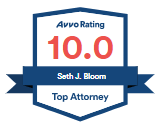Hurricane & Disaster Insurance for Policyholders in Louisiana
Holding Insurers Accountable. Protecting What Matters Most.
When disaster strikes, your insurance policy is supposed to be a safety net, not another obstacle. However, far too often, policyholders across the Gulf Coast find themselves in a challenging battle with their own insurance companies, facing denied claims, underpaid claims, or unreasonable delays.
We stand firmly on the side of policyholders at Bloom Legal Network, helping individuals, families, and business owners secure the insurance benefits they are rightfully owed, especially after the devastating impact of hurricanes and other natural disasters.
Whether you’re dealing with the aftermath of a major hurricane, business interruption, flood losses, or a denied property claim, our insurance coverage attorneys are here to advocate for your recovery. From Metairie to New Orleans, we understand the complexities of state-specific insurance laws and how to make them work for you.
We don’t represent big insurance companies. We fight for people, property owners, and businesses – the ones who pay their premiums and deserve full and fair coverage!
Our Commitment to Policyholders: Especially After the Storm
Our mission is simple: hold insurance companies accountable and help our clients get the coverage they paid for.
Insurance companies are profit-driven businesses. When claims arise, especially after major storms, they may delay, underpay, or outright deny valid claims. We provide the legal muscle you need to fight back.
Our team of dedicated insurance claim attorneys offers strategic, client-focused legal representation for:
- Hurricane Damage Insurance Claims
- Residential property damage claims
- Commercial property and business interruption claims
- Flood and windstorm claims
- Fire and smoke damage claims
- Roof damage and water intrusion
- Total loss disputes and undervaluation
- Bad faith insurance denials
Hurricane Damage Insurance Claims
The Gulf Coast is no stranger to hurricanes, tropical storms, and devastating flooding. When your home or business suffers storm damage, your insurance policy should provide critical relief. But too often, policyholders are met with delays, excuses, or lowball settlements.
Our attorneys in New Orleans and Jefferson Parish are highly experienced in hurricane insurance claims, especially those involving:
- Extensive Roof damage and structural collapse
- Severe Mold and water intrusion
- Interior destruction and inventory loss
- Additional Living Expenses (ALE)
- Wind vs. Flood Disputes
We thoroughly analyze your insurance policy, assess the full extent of your losses, and build a strong claim backed by expert reports and evidence. If the insurer acts in bad faith, we pursue additional damages under applicable state law
Hurricane Season: Understanding the Pattern of Risk & Staying Safe
Hurricane season officially runs from June 1st to November 30th across the Atlantic basin, impacting states like Louisiana, Texas, and Florida. The peak of the season is typically from mid-August through October.
Insurance companies often try to use prior storm damage as a reason to minimize or deny new claims. Understanding the timeline of major hurricanes and weather events is critical to separating new damage from pre-existing conditions.
Key Storms Impacting Louisiana (and often influencing the region):
- Hurricane Betsy (September 1965): A devastating Category 3 hurricane that caused widespread flooding and property damage, particularly in the New Orleans area.
- Hurricane Camille (August 1969): Though its primary landfall was Mississippi, Camille’s immense power brought significant impacts to Southeast Louisiana, including storm surge and heavy rainfall.
- Hurricane Juan (October 1985): An unusual late-season storm that stalled over Louisiana, causing extensive flooding and prolonged damage.
- Hurricane Andrew (August 1992): A powerful Category 5 hurricane that made landfall in Florida and then western Louisiana, causing significant wind damage.
- Hurricane Georges (September 1998): Brought substantial storm surge and wind damage to the southeastern coast of Louisiana.
- Hurricane Katrina (August 2005): One of the most catastrophic hurricanes in U.S. history, causing unprecedented flooding and destruction, especially in New Orleans and coastal communities, leading to immense insurance litigation.
- Hurricane Rita (September 2005): Followed Katrina, causing additional widespread damage, particularly to Southwest Louisiana, but also impacting Southeast Louisiana.
- Hurricane Gustav (September 2008): A large hurricane that caused significant wind damage and power outages across Louisiana.
- Hurricane Ike (September 2008): Though centered further west, Ike’s immense size brought a significant storm surge and wind to coastal Louisiana.
- Hurricane Isaac (August 2012): A slow-moving hurricane that caused prolonged rainfall and flooding across the region.
- The Great Louisiana Flood (August 2016): A historic flood event, primarily caused by non-tropical heavy rainfall, that devastated homes and businesses across southern Louisiana, leading to numerous flood insurance claims.
- Hurricane Laura (August 2020): While its direct impact was further west, Laura brought significant winds and indirect effects to parts of Louisiana.
- Hurricane Delta (October 2020): Also primarily western Louisiana, Delta contributed to continued storm fatigue and secondary impacts in the southeast.
- Hurricane Zeta (October 2020): A rapid-moving hurricane that caused considerable wind damage and power outages in the New Orleans metro area.
- Hurricane Ida (August 2021): A powerful Category 4 hurricane that caused widespread destruction, particularly south of New Orleans, leading to major property damage and business interruption claims across the region.
If your claim involves any of these storms, timing matters. We help document when the damage occurred and ensure your claim is not unfairly reduced due to overlapping disasters.
Hurricane Safety and Information
Preparing for hurricane season is crucial. We encourage all residents in hurricane-prone areas to:
- Develop a family emergency plan, including evacuation routes.
- Assemble a comprehensive emergency kit with food, water, medications, and important documents.
- Secure your property by trimming trees, clearing gutters, and securing loose outdoor items.
- Understand your insurance policies, especially regarding wind and flood coverage, as they are often separate.
- Stay informed through local weather alerts and official advisories.
Get in contact with our team today to discuss your claim or for more hurricane preparedness resources!
Bad Faith Insurance Practices: Know Your Rights
Under various state statutes (like Louisiana Revised Statutes §§ 22:1973 and 22:1892), insurance companies owe their policyholders a duty of good faith and fair dealing. When they fail to honor that duty, by delaying payment, misrepresenting coverage, or forcing unnecessary investigations, they may be liable for penalties and attorney’s fees.
Signs of bad faith insurance conduct include:
- Delaying claim processing beyond statutory deadlines
- Denying claims without valid reasons
- Underestimating repair or replacement costs
- Failing to properly investigate a claim
- Misinterpreting policy language against the insured
If your insurer is acting in bad faith, we’re prepared to file suit and demand full compensation, including penalties and damages for your suffering and financial losses.
Commercial Insurance Claims and Business Interruption
Natural disasters don’t just damage buildings, they disrupt entire business operations. For business owners across hurricane-impacted regions, a denied or underpaid commercial property or business interruption claim can be devastating.
We represent small and mid-sized business owners in:
- Business income loss due to hurricane or flood
- Claims involving vandalism, theft, or fire
- Denial of coverage for necessary repairs or replacement
- Insurance disputes related to COVID-19 closures (where applicable)
We review complex commercial policies, identify coverage exclusions, and develop tailored legal strategies to maximize your recovery and reduce long-term business impact.
Hurricane Recovery Legal Support: We’re Here to Help
The First 30 Days After the Storm Matter. Let’s Get to Work.
Storm recovery is overwhelming, but taking the right legal steps early on can make all the difference in your financial recovery. Our Hurricane Recovery Legal Support services are designed to help residents and businesses take action quickly after a disaster.
Our dedicated hurricane damage lawyers are deeply experienced in advocating for clients affected by catastrophic losses. We understand the unique aspects of insurance law regarding hurricane claims, including specific timelines for filing and requirements for proof of loss, across different states. We assist with:
- Filing Hurricane Claims: Ensuring timely and proper submission of your initial claim.
- Damage Assessment: Working with adjusters and experts to thoroughly document all damages.
- Wind vs. Flood Disputes: Navigating the common challenges of distinguishing between wind and flood damage, especially when multiple policies are involved.
- Temporary Repairs & Mitigation: Advising on steps to prevent further damage and ensuring these costs are covered.
- Additional Living Expenses (ALE) Claims: Helping you recover costs for temporary housing if your home is uninhabitable.
- Business Interruption Claims from Hurricanes: Securing lost profits and operational expenses for businesses impacted by storms.
- Negotiating with Adjusters: Protecting your interests during inspections and settlement discussions.
- Bad Faith Actions: Taking legal action against insurers who fail to properly investigate, evaluate, or pay hurricane claims.
We are committed to helping our communities rebuild and recover after these devastating events. Don’t leave money on the table, and don’t face the insurer alone – We’re here to help you!
Why Choose Bloom Legal Network for Your Insurance Claim?
You paid your premiums. Now you need someone to fight for you.
We combine deep knowledge of insurance law with a commitment to personal service. Our attorneys understand how local insurers operate, how to build strong cases, and how to make sure your voice is heard.
With Bloom Legal Network, you get:
- A team that works only for policyholders, never for insurers
- Personalized attention and responsive legal support
- Aggressive advocacy in both negotiations and litigation
- Local insight into storm history and risk profiles across hurricane-prone states
- Proven experience handling complex insurance and hurricane claims
- A network of legal professionals for complex multi-state disaster litigation
Frequently Asked Questions About Insurance Coverage Litigation
“Bad faith” in Louisiana refers to an insurance company’s unreasonable or unwarranted actions (or inaction) in handling a policyholder’s claim. Louisiana Revised Statutes 22:1973 and 22:1892 define specific acts that can constitute bad faith, such as misrepresenting policy provisions, failing to pay a settlement within 30 days of an agreement, denying coverage without a reasonable basis, or failing to pay a claim within 60 days of satisfactory proof of loss without probable cause. If an insurer acts in bad faith, you may be entitled to additional damages and penalties beyond your original claim amount.
Immediately after property damage, prioritize safety. Then, document everything: take extensive photos and videos of the damage before any cleanup. Make temporary, reasonable repairs to prevent further damage (e.g., tarping a roof), and keep all receipts. Notify your insurance company promptly, usually within a few days. Do not dispose of damaged property until it has been inspected or documented. Be cautious about signing anything that releases your rights before understanding its implications. It’s often advisable to contact an insurance coverage attorney early in the process, especially for significant damage.
It depends on your specific commercial property insurance policy. Many policies include Business Interruption (BI) insurance or Business Income coverage, which is designed to replace lost income and cover ongoing operating expenses when your business is forced to close or reduce operations due to a covered peril (like hurricane damage). However, these policies often have specific triggers, exclusions (e.g., for flood if not explicitly covered), and calculation methods. If your business is suffering losses, it’s crucial to review your policy and consult with an attorney experienced in business interruption claims to understand your rights and accurately calculate your losses.
This is a very common and frustrating scenario in Louisiana, particularly after hurricanes, as wind damage is covered by homeowner’s insurance while flood damage typically requires a separate flood insurance policy (often through the NFIP). Insurers may dispute the cause of damage to minimize their payout. Your options include: 1) Thoroughly reviewing your policy to understand definitions and exclusions; 2) Gathering evidence that supports wind damage (e.g., eyewitness accounts, expert reports on waterlines, structural damage patterns); 3) Appealing the denial with your insurer; and 4) If necessary, filing a bad faith lawsuit against your homeowner’s insurer. An experienced insurance dispute attorney can help you challenge the insurer’s determination and prove the true cause and extent of your losses.
Speak with an Insurance Litigation Attorney in New Orleans Today
No matter the size of your property or business, your insurance claim deserves full attention and fair treatment. Let us take the legal burden off your shoulders so you can focus on rebuilding.
📞 Call today: 504-599-9997
📧 Email us: info@bloomlegal.com
Bloom Legal Network – Your Partner in Disaster Recovery & Insurance Claims.





